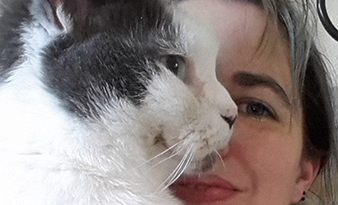What was your first pet?
A rabbit called Pepper, but quickly followed by chickens – fabulous pets!
What is your favourite animal?
The Sheep. I have my own flock of Hebridean Sheep and Poll Dorsets. Hebrideans are majestic and I enjoy keeping them, Poll Dorsets are docile to work with and more likely to be pleased to see me!
What is the most memorable or unusual animal you have treated?
The first cow I ever calved on my own – an Aberdeen Angus. She was beautifully well behaved and she had a lovely calf. A proud moment!
What is your ultimate veterinary dream?
Perhaps to have my own resident in the future… Watch this space.
Emily Gascoigne describes her decisions and the pathway by which she has achieved specialist recognition in Small Ruminant Health Management.
My work
I work in a practice in the South West of England and the majority of the work of the practice is with dairy cows. Because of my personal interest over 60% of my work is with small ruminants and in particular sheep. I work with both small and large sheep farms, pedigree and non-pedigree sheep and also do some conservation work.
Our practice also helps veterinary students and recent graduates. They come and see practice with us to learn about veterinary large animal farm work.
In my spare time I also am a committee member for several veterinary organisations (Sheep Veterinary Society, Goat Veterinary Society and National Sheep Association South West). At the time of writing, Brexit certainly makes for interesting times on these committees.
Why did I decide to become a Specialist?
I graduated from the University of Cambridge in 2012 with a special interest in sheep health and welfare. Because I was keen to learn more I decided that an alternative residency with the European College of Small Ruminant Health Management (ECSRHM) would be the most appropriate route. Most residencies mean that you have to spend a minimum of 3 years at a university, but the alternative route allows you to train whilst continuing to work in practice. It generally does mean that the training takes longer and you need to do a lot of planning to make sure that all aspects of the Specialist training have been covered.
How did I become a Specialist?
Having worked in practice for three years I had begun to establish working relationships with my farms. I was committed to staying within the practice and was able with the support of my practice to enroll on an alternative residency with the ECSHRM under the supervision of Dr. Fiona Lovatt and the mentorship of Kat Bazeley. My specialist areas of interest include neonatal lamb health, eyelid disease in sheep and flock health. I completed my residency in 2018 and became a Specialist by examination. I now continue to work in practice.
What does being a Specialist add to my role in practice?
Because of my expertise my colleagues in the practice will refer the more complex problems in small ruminants to me and this also helps them improve in their knowledge of small ruminants as well. Because of my Specialist status I have opportunities to collaborate (also internationally) and this has already been useful for the flocks in my practice in the South West of England, by being involved in research and the most up to date thinking.
Why is being a Specialist important?
To me personally I enjoy being an expert on something I love doing. I also think that specialist recognition provides the public with an assurance that I have developed a certain level of expertise and that this level of expertise is being kept up to date.

